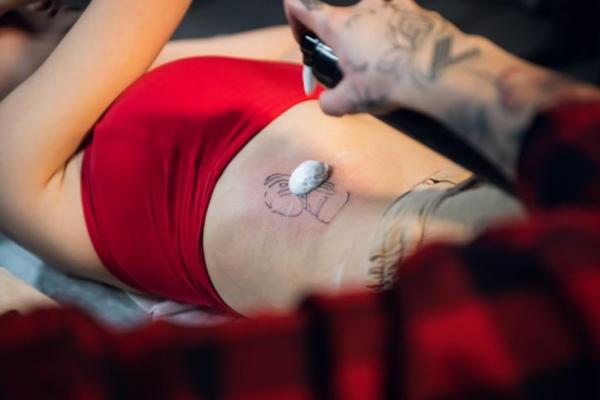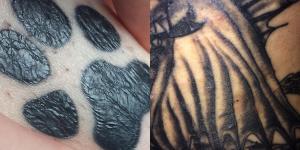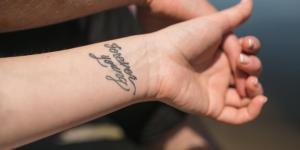What Happens If I Don't Moisturize My Tattoo?


Lots of people decide to get a tattoo at some point in their lives. It makes for a lasting memory, but by taking proper care of it, we can best ensure it is a happy memory. Following proper tattoo aftercare guidelines will help to best preserve the quality of the tattoo. Moreover, it will prevent infections and their symptoms, ensuring your tattoo does not become a health risk. Neutral soap and moisturizing cream for tattoos are your best tools and will need to be used as soon as the tattoo is completed.
To help you understand the importance of tattoo aftercare, oneHOWTO asks what happens if I don't moisturize my tattoo? This is a process called dry healing and it is something which should be avoided.
What happens if I don't moisturize my freshly done tattoo?
The natural healing process of a tattoo lasts between 7 and 14 days. Of course, this is relative and depends on the size of the tattoo and the area of the body. Your body’s reaction and ability to heal will also be factors. For this reason, healing can take up to 30 days.
During this time it is vital that you give special attention to the tattoo and provide specific care. The idea is for it to heal well and fast. This will help us avoid any complications, especially infections.
To ensure fast and proper healing, most tattoo artists recommend using specific products that aid the healing process and prevent infections. These products take care of the skin, preventing any wrinkling of the skin, dryness or even infections. In addition to being a health risk, these conditions leave the tattoo in poor condition and spoil the design.
So, when treating tattoos we should use a neutral soap for daily washing, followed by a moisturizing cream. But, what happens you choose dry healing of tattoos, i.e. if you don't moisturize your freshly done tattoo?
This type of product will help the tattoo heal faster and more effectively, keeping the skin moisturized and in perfect condition. It is also important to use this type of cream to soothe the area and help the tattoo to keep its luster and color. Where possible, you should avoid scented creams or applying large amounts of cream. The latter can prevent the skin from being able to breathe.
Only a thin layer of cream should be applied to the skin, just enough to help the pores close quickly. This will prevent the loss of too much ink and protect the tattoo more effectively.
If you do not use healing cream on a fresh tattoo, the process will take longer and complications are more likely. There is also a higher chance of it becoming infected, especially if you do not wash it properly. Finally, with dry healing, there is also the risk that the quality of the final tattoo will not be as you expected, e.g the drawing may be deformed or the colors will be duller.
What creams are used on new tattoos?
Now you know that dry healing your tattoo is not a good option, you should know what options are available. Tattoo creams have been created to help a new tattoo to heal, maintain its shine and color, and care for the skin at the same time. Therefore, it is very important to use creams which are suitable for tattoos and not just any oil or moisturizing creams. So, what is the best cream for tattoos?
Bepanthen was not originally design for tattoo aftercare, but it is one of the most suitable for the job. For this reason, it is very popular with tattoo artists. Its high dexpanthenol content is great for treating irritated, chapped or slightly burned skin. Additionally, its lipid substances form a thin protective layer on the skin. Acting as a protective barrier, it moisturizes the skin and prevents excessive water loss.
This cream will be your best friend during the healing process, but for how many days should you use Bepanthen cream? The healing process can vary from one person to another. However, it is recommended that Bepanthen is used for the first 15 days. After that, you can use a moisturizing cream without scents or alcohols for the next 6 days. Alternatively, you can keep using Bepanthen until the tattoo is healed.
These extra days will help finalize the healing process and moisturize the healed tattoo. Be careful not to overdo it with the amount of moisturizer. Here you can learn more about side effects of tattoos with our article on why your tattoo is swelling up.

If I don't have Bepanthen, what can I use?
In addition to Bepanthen, other brands of moisturizers are available for helping new tattoos to heal properly. You can either buy them directly from the tattoo studio itself or at a pharmacy. However, we recommend you follow any suggestions for care made by your tattoo artist, since they know the specific products and results.
Ask at a pharmacy for high quality post-tattoo creams, self-adhesive curing sheets and for neutral soap to clean your tattoo. The curing sheets will help you during the first 5 days. Many tattoo studios will provide you with one or more of these by the tattoo artist when you have the tattoo done.
Beware of applying other types of products. Vaseline (petroleum jelly) was often used, but it was shown to have more disadvantages than benefits in the healing process. In theory, we only need a protective layer that will prevent infection or contact with unclean surfaces. However, this film provides such a complete seal that the skin can not breathe. What is more, it can not get rid of excess ink and any liquid is trapped, most likely leading to infection.
Here we tell you in more detail the pros and cons of using Vaseline for tattoo aftercare.
If you resort to homemade moisturizers to help your tattoo heal, you should prepare them with ingredients that have antiseptic, healing and antibacterial properties. These can include thyme, rosemary, aloe vera, garlic, honey, rosehip oil, tea tree oil (in very low doses) or almond oil, etc. Be careful if you are unsure and opt for a commercial brand if you cannot guarantee its safety and effectiveness in tattoo healing.
What moisturizer should I use when the tattoo has healed?
Once the tattoo has healed, it is still important to care for and moisturize the skin, just as you would normally. Moisturizing the tattoo area and keeping the skin healthy will make the tattoo look more beautiful and stay in perfect condition for a long time. Therefore, once your tattoo is healed, you can use any body moisturizer which works for your skin-type.
If the tattoo is still swollen, even if only slightly, you should wait before starting to use normal moisturizers. If in doubt, you should consult your tattoo artist before starting to use other creams or ointments.

How to cure an infected tattoo
If you have not followed the above recommendations, or those of your tattoo artist, and chosen dry healing, your tattoo will likely show signs of infection. The most common symptoms of tattoo infection are swelling or redness in the tattooed area, pain, pus, blisters, pimples, itching, as well as having a temperature. Here we tell you more about How to tell if a tattoo is infected.
If you find yourself in this situation or you have noticed any of these symptoms and you have doubts, the first thing we advise you to do is to go to your doctor. They will then be able to assess the degree of infection and the state of the tattoo. Do not forget to follow all their recommendations.
An addition to this, the following tips will help you to cure an infected tattoo:
- Stop using moisturizing creams, and you will avoid softening the skin of the wound. You can continue to use creams that help you both to heal and to disinfect, such as antibiotic creams, which are sold in pharmacies.
- Wash the tattoo properly with neutral soap and warm water at least 3 times a day. It is very important to always keep the wound clean to avoid complications.
- Dry the tattoo completely with kitchen paper, dabbing gently, without rubbing or scratching.
- Do not scratch the tattoo, even if it itches. The scab should dry and fall off on its own.
- To reduce any itching, irritation and inflammation caused by the infection, you can apply ice with a clean cotton cloth or wet towel for a few minutes.
- Allow the wound to breathe to speed up recovery. Try to wear loose and breathable clothing or leave the tattooed area exposed to the fresh air.
- Avoid exposing the tattoo to the sun. The ultraviolet rays could burn the tattoo and cause it to completely lose its color, adding to any damage done by the infection.
Here we explain more details on how to heal an infected tattoo.
Bear in mind that good aftercare is vital for all tattoos, helping you to stay healthy and get the best possible final result from the design. That being said, certain cases, such as scarification, will require closer attention as they pose a greater health risk. Learn more about what scarification tattoos are with this other post.
If you want to read similar articles to What Happens If I Don't Moisturize My Tattoo?, we recommend you visit our Beauty & Personal Care category.







